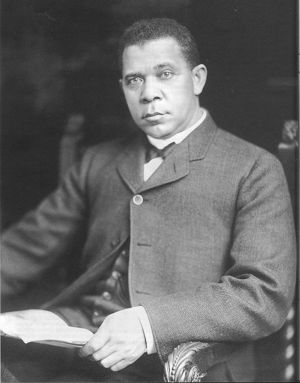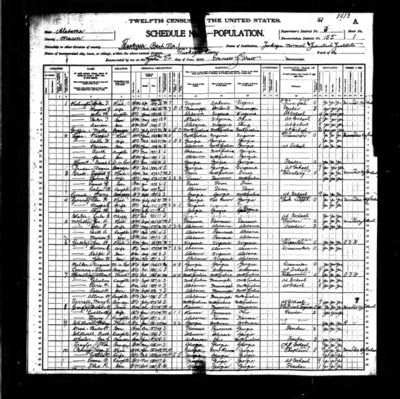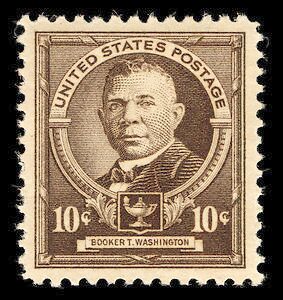Booker T. Washington
Booker Taliaferro Washington (April 15, 1856 – November 14, 1915) was a leader of the African American community in the United States in the early 20th century. After his death his style of publicly accepting segregation, working with rich and powerful whites, and avoiding public protests came under attack by militant blacks.
Washington was born into slavery to a white father and a black slave mother on a rural farm in southwestern Franklin County, Virginia; the slaves were freed in 1865. He attended Hampton University and Wayland Seminary. In 1881 he became the first head the new normal school (teachers' college) which became Tuskegee University in Alabama.
Washington was the dominant figure in the African American community from 1890 to 1915, especially after he achieved prominence for his Atlanta Compromise of 1895. White leaders in politics and philanthropy recognized him as the spokesperson for African American citizens. Representing the last generation of black leaders born into slavery, he was credible when speaking publicly and seeking educational improvements for those freedmen who had remained in the New South in an uneasy second-class relationship with whites under the "Jim Crow" system of segregated schools and jobs. He built his leadership of the African American community nationwide through a network of core supporters, including black educators, ministers, editors and businessmen. He gained access to top national leaders in politics, philanthropy and education, and was awarded honorary degrees. Critics called his network of supporters the "Tuskegee Machine."
Late in his career, Dr. Washington was criticized by the leaders of the NAACP (formed in 1909), especially by W.E.B. DuBois, who demanded a stronger, more public line on civil rights protests. After being labeled "The Great Accommodator" by DuBois, Dr. Washington replied that confrontation would lead to disaster for the outnumbered blacks, and that cooperation with supportive whites was the only way to overcome pervasive racism in the long run. Although he did some aggressive civil rights work secretively, such as funding court cases,[1] he seemed to truly believe in skillful accommodation to many of the social realities of the age of segregation.[2] While apparently resolved to many undesirable social conditions in the short term, he also clearly had his eyes on a better future for blacks. Through his own personal experience, Dr. Washington knew that a good education is a major and powerful tool for individuals to collectively accomplish that better future.
Washington's philosophy and tireless work on education issues helped him enlist both the moral and substantial financial support of many philanthropists. He became friends with millionaires such as Standard Oil magnate Henry H. Rogers and Sears, Roebuck and Company President Julius Rosenwald. They funded his causes, especially in education. To upgrade the schools open to blacks Washington solicited millions of dollars, often using matching funds that stimulated local contributions. Washington's system established and operated over 5,000 schools and supporting resources throughout the South. This work was a major part of his legacy and was continued (and expanded through the Rosenwald Fund and others) for many years after Washington's death in 1915.[3]
Washington was the central figure in improving the overall friendship and working relationship between the races in the United States, and heading off the "herrenvolk" racism of lower class whites expressed through lynching and led by Ben Tillman. His powerful autobiography, Up From Slavery[4] (1901) was widely read among blacks and sympathetic whites. It told the story of his own emancipation, education, and successful career to inspire southern blacks who had been denied opportunity for education and self-improvement. He carried the same theme forward in The Story of the Negro: The Rise of the Race from Slavery (1909). Washington, in contrast to the civil rights activists like DuBois and the NAACP, deemphasized politics in favor of the importance of cultivating middle class habits of skill, industry, thrift and character so that blacks, having prepared themselves educationally and culturally for the responsibility, would be accepted by liberal whites as meriting civil rights.
Youth, freedom and education
Booker T. Washington was born a slave on April 5, 1856, on the Burroughs farm at the community of Hale's Ford, Virginia. His mother, Jane, was a black slave who worked as a cook, and his father was a white man who owned a nearby farm. Under the laws of the time, his mother's status also made young Booker a slave. The "T" in his name stood for Taliaferro, his owner's name. He recalled Emancipation in early 1865:[5]
As the great day drew nearer, there was more singing in the slave quarters than usual. It was bolder, had more ring, and lasted later into the night. Most of the verses of the plantation songs had some reference to freedom.... Some man who seemed to be a stranger (a United States officer, I presume) made a little speech and then read a rather long paper -- the Emancipation Proclamation, I think. After the reading we were told that we were all free, and could go when and where we pleased. My mom, who was standing by my side, leaned over and kissed her children, while tears of joy ran down her cheeks. She explained to us what it all meant, that this was the day for which she had been so long praying, but fearing that she would never live to see.
In the summer of 1865, at the age of nine, Booker and his brother John and his sister, Amanda, moved to Kanawha County, West Virginia with their mother to join his stepfather, whose last name was Washington. When he could, young Booker attended school and learned to read and to write.[6]
Leaving home at sixteen, Washington enrolled at the Hampton Normal and Agricultural Institute, in Hampton, Virginia. Tuition was low and school jobs were available, so Washington paid his own way. The normal school (teachers college) at Hampton was founded for the purpose of training black teachers and had been largely funded by church groups. From 1878 to 1879 he attended Wayland Seminary in Washington, D.C., and returned to teach at Hampton. Soon, Hampton officials recommended him to become the first principal of a similar school being founded in Alabama.[7]
Tuskegee
The black organizers of a new all-black state normal school in Tuskegee, Alabama found the energetic and visionary leader they sought in 25 year-old Booker T. Washington, who bore the strong recommendation of Hampton president Samuel C. Armstrong. Washington thus became the first principal of the Tuskegee Normal and Industrial Institute, with a $2,000 annual appropriation from the state legislature. The new school opened on July 4, 1881, initially using space rented from a local church. The next year, Washington purchased a former plantation, which became the permanent site of the campus. The school later grew to become the present-day Tuskegee University.[8]
Tuskegee provided an academic education and instruction for teachers, but included skills such as carpentry and masonry that the graduates could teach in all-black schools in Alabama. The institute illustrates Washington's aspirations for his race. His theory was, that by providing these skills, African Americans would play their part in society and this would lead to acceptance by white Americans. He believed that African Americans would eventually gain full civil rights by showing themselves to be responsible, reliable American citizens. He was head of the school until his death in 1915. By then Tuskegee's endowment had grown to over $1.5 million, compared to the initial $2,000 annual appropriation.[9]
Family
Washington was married three times. In his autobiography Up From Slavery, he gave all three of his wives enormous credit for their work at Tuskegee and was emphatic that he would not have been successful without them.
Fannie N. Smith was from Malden, West Virginia, the same Kanawha River Valley town located eight miles upriver from Charleston where Washington had lived from age nine to sixteen (and maintained ties throughout his later life). Washington and Smith were married in the summer of 1882. They had one child, Portia M. Washington. Fannie died in May 1884.[10]
Washington next wed Olivia A. Davidson in 1885. Davidson was born in the black community in Ohio, spent time teaching in Mississippi and Tennessee and received her education at Hampton Institute and the Massachusetts State Normal School at Framingham. Washington met Davidson at Tuskegee, where she had come to teach. She later became the assistant principal there. They had two sons, Booker T. Washington Jr. and Ernest Davidson Washington, before she died in 1889.
Washington's third marriage took place in 1893 to Margaret James Murray. She was from Mississippi and was a graduate of Fisk University. They had no children together. Murray outlived Washington and died in 1925.
Politics
Washington's 1895 Atlanta Compromise address, given at the Cotton States and International Exposition in Atlanta, Georgia, was widely welcomed in the African American community and among liberal whites North and South. He was supported by W.E.B. DuBois at the time but several years later the two had a falling out. Washington valued the "industrial" education oriented toward actual jobs available to the majority of African Americans at the time and DuBois demanded a "classical" (liberal arts) education among an elite he called "The Talented Tenth." Both sides sought to define the best means to improve the conditions of the post-Civil War African-American community. While not publicly attacking Jim Crow laws, Washington privately contributed funds for legal challenges against legal segregation and disfranchisement, such as his secret support in the case of Giles v. Harris, which went before the United States Supreme Court in 1903.[11] Washington aggressively fought off competition, such as the Niagara Movement, formed in 1905 and practically defunct by 1909. In 1909, Du Bois and other blacks from the Niagara movement joined with a group of white liberals in the formation of the National Association for the Advancement of Colored People (NAACP), which proved a more formidable opponent of Washington, since it built a national network of local chapters.
Blacks were solidly Republican, but after 1890 many lost the vote in the deep South (but continued to vote in border and northern states). Washington emerged as their spokesman and was routinely consulted by Republican national about the appointment of African Americans to political positions throughout the nation. He worked and socialized with many white politicians and notables. He argued that the surest way for blacks eventually to gain equal rights was to demonstrate patience, industry, thrift, and usefulness and said that these were the key to improved conditions for African Americans in the United States; and that they could not expect too much, having only just been granted emancipation.[12]
Wealthy friends and benefactors
Washington associated with the richest and most powerful businessmen and politicians of the era. He was seen as a spokesperson for African Americans and became a conduit for funding educational programs. His contacts included such diverse and well-known personages as Andrew Carnegie, William Howard Taft, Henry Huttleston Rogers, and Julius Rosenwald, to whom he made the need for better educational facilities well-known. As a result, countless small schools were established through his efforts, in programs that continued many years after his death.
Henry Rogers
A representative case of an exceptional relationship was Washington's friendship with millionaire industrialist and financier Henry H. Rogers (1840-1909). Rogers was a self-made man, who had risen from a modest working-class family to become a principal of Standard Oil, and had become one of the richest men in the United States. He met Washington in 1894 and Washington was a frequent guest at Rogers' New York office, his summer home, and aboard his yacht. After Rogers died Washington revealed that he had been quietly funding operations of 65 small country schools, and had given substantial sums of money to support Tuskegee Institute and Hampton Institute.
Jeanes and Rosenwald
Anna T. Jeanes (1822-1907) of Philadelphia in 1907 gave Washington $1 million to build schools in 1907.
Julius Rosenwald (1862-1932) was another self-made wealthy man with whom Dr. Washington found common ground. By 1908, Rosenwald, son of an immigrant Jewish clothier, had become owner and president of Sears, Roebuck and Company in Chicago. Rosenwald was a philanthropist who was deeply concerned about the poor state of African American education, especially in the Southern states.
In 1912 Rosenwald was asked to serve on the Board of Directors of Tuskegee Institute, a position he held for the remainder of his life. Rosenwald endowed Tuskegee so that Dr. Washington could spend less time traveling to seek funding and devote more time towards management of the school. Later in 1912, Rosenwald provided funds for a pilot program involving six new small schools in rural Alabama, which were designed, constructed and opened in 1913 and 1914 and overseen by Tuskegee; the model proved successful. Rosenwald established the Rosenwald Fund. The school building program was one of its largest programs. Using state-of-the-art architectural plans initially drawn by professors at Tuskegee Institute, the Rosenwald Fund spent over four million dollars to help build 4,977 schools, 217 teachers' homes, and 163 shop buildings in 883 counties in 15 states, from Maryland to Texas.[13] The Rosenwald Fund used a system of matching grants, and black communities raised more than $4.7 million to aid the construction.[14] These schools became known as Rosenwald Schools. By 1932, the facilities could accommodate one third of all African American children in Southern U.S. schools.
Up from Slavery, invitation to the White House
In an effort to inspire the "commercial, agricultural, educational, and industrial advancement" of African Americans, Washington founded the National Negro Business League (NNBL) in 1900.[15]
When Washington's autobiography, Up From Slavery,[4] was published in 1901, it became a bestseller and had a major impact on the African American community, and its friends and allies. Washington in 1901 was the first African-American ever invited to the White House as the guest of President Theodore Roosevelt – white Southerners complained loudly.
Lifetime of overwork, death at age 59
Despite his travels and widespread work, Dr. Washington remained as principal of Tuskegee. Washington's health was deteriorating rapidly; he collapsed in New York City and was brought home to Tuskegee, where he died on November 14, 1915 at the age of 59. The cause of death was unclear, probably from nervous exhaustion and arteriosclerosis.[16] He was buried on the campus of Tuskegee University near the University Chapel.
At his death Tuskegee's endowment exceeded $1.5 million. He was succeeded as president by Robert Russa Moton.
Honors and memorials
For his contributions to American society, Dr. Washington was granted an honorary master's degree from Harvard University in 1896 and an honorary doctorate from Dartmouth College in 1901.
In 1940 Washington became the first African American to be depicted on a United States postage stamp. The first coin to feature an African American was the Booker T. Washington Memorial Half Dollar that was minted by the U.S. from 1946 to 1951.
On April 5, 1956, the hundredth anniversary of Washington's birth, the house where he was born in Virginia was designated as the Booker T. Washington National Monument. A state park in Chattanooga, Tennessee was named in his honor, as was a bridge spanning the Hampton River adjacent to his alma mater, Hampton University.
In 1984, Hampton University dedicated a Booker T. Washington Memorial on campus near the historic Emancipation Oak, establishing, in the words of the University, "a relationship between one of America's great educators and social activists, and the symbol of Black achievement in education."[17]
Over 45 elementary schools, middle schools, and high schools across the United States have been named after Booker T. Washington.[18]
At the center of the campus at Tuskegee University, the Booker T. Washington Monument, called "Lifting the Veil," was dedicated in 1922. The inscription at its base reads:
- "He lifted the veil of ignorance from his people and pointed the way to progress through education and industry."
Notes
- ↑ Meier 1957
- ↑ Harlan (1983) p. 359
- ↑ Anderson (1998)
- ↑ 4.0 4.1 Booker T. Washington. (1901) Up From Slavery Full-Text Online.
- ↑ Up from Slavery 19-21
- ↑ Harlan (1972)
- ↑ Harlan (1972)
- ↑ Harlan (1972)
- ↑ Harlan (1972); Harlan (1983)
- ↑ Harlan (1972)
- ↑ Harlan (1971)
- ↑ Harlan (1972)
- ↑ See [1],
- ↑ See [2]
- ↑ See [3]
- ↑ The question of syphilis is discussed in Harlan 2:451-55
- ↑ See [4]
- ↑ The Booker T. Washington Society: Frequently Asked Questions. Booker T. Washington Society. Retrieved on 11 October 2013.


